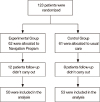Abstract
Purpose
This study was to identify how a navigation program would affect resilience, uncertainty and anxiety in patients with newly diagnosed gastric cancer.
Methods
A randomized controlled design was used with 103 participants recruited and randomly allocated in two groups. The experimental group (n=50) received the navigation program, which consisted of information provisions and psychological support, prior to treatment. The control group (n=53) received standard care with general educational intervention only prior to treatment. Collected data were analyzed using SPSS for Windows.
Figures and Tables
Table 1
Navigation Program for Patients with Newly Diagnosed Gastric Cancer

Table 2
Homogeneity Test of Characteristics between Groups (N=103)

Table 3
Homogeneity Test of Dependent Variables between Groups at the Baseline (N=103)

Table 4
Effects of a Navigation Program on Resilience, Uncertainty, Anxiety (N=103)

References
1. Jung KW, Won YJ, Kong HJ, Oh CM, Cho HS, Lee DH, et al. Cancer statistics in Korea: incidence, mortality, survival, and prevalence in 2012. Cancer Res Treat. 2015; 47(2):127–141.

2. Oh PJ. Correlation between mental adjustment to cancer and anxiety. J Korean Oncol Nurs. 2009; 9(1):23–30.
3. Burgess C, Cornelius V, Love S, Graham J, Richards M, Ramirez A. Depression and anxiety in women with early breast cancer: five year observational cohort study. BMJ. 2005; 330(7493):702.

4. Wi ES, Yong J. Distress, depression, anxiety, and spiritual needs of patients with stomach cancer. Asian Oncol Nurs. 2012; 12(4):314–322.

6. Chung C, Kim MJ, Rhee MH, Do HG. Functional status and psychosocial adjustment in gynecologic cancer patients receiving chemotherapy. Korean J Women Health Nurs. 2005; 11(1):58–66.

7. Luthar SS, Cicchetti D, Becker B. The construct of resilience: a critical evaluation and guidelines for future work. Child Dev. 2000; 71(3):543–562.

8. Baek HS, Lee KU, Joo EJ, Lee MY, Choi KS. Reliability and validity of the Korean version of the connor-davidson resilience scale. Psychiatry Investig. 2010; 7(2):109–115.

9. Suh EE, Park Y, Kim S. The patients’ experiences of the diagnosis and pre-treatment period of breast cancer. J Korean Acad Fundam Nurs. 2008; 15(4):495–503.
10. Cleeland CS. Symptom burden: multiple symptoms and their impact as patient-reported outcomes. J Natl Cancer Inst Monogr. 2007; 37:16–21.

11. Freeman HP, Rodriguez RL. History and principles of patient navigation. Cancer. 2011; 117(S15):3539–3542.

12. Campbell C, Craig J, Eggert J, Bailey-Dorton C. Implementing and measuring the impact of patient navigation at a comprehensive community cancer center. Oncol Nurs Forum. 2010; 37(1):61–68.

13. Fillion L, Cook S, Veillette AM, Aubin M, de Serres M, Rainville F, et al. Professional navigation framework: elaboration and validation in a Canadian context. Oncol Nurs Forum. 2012; 39(1):58–69.

14. Ferrante JM, Chen PH, Kim S. The effect of patient navigation on time to diagnosis, anxiety, and satisfaction in urban minority women with abnormal mammograms: a randomized controlled trial. J Urban Health. 2008; 85(1):114–124.

15. Pedersen AE, Hack TF. The British Columbia Patient Navigation Model: a critical analysis. Oncol Nurs Forum. 2011; 38(2):200–206.

16. Kwon IG, Hong JY, Baek HJ, Kim S, Nam SJ, Kim IR, et al. Development and evaluation of a navigation program for newly diagnosed cancer patients. J Korean Clin Nurs Res. 2012; 18(1):111–125.
17. Spielberger CD. State Trait Anxiety Inventory: Wiley Online Library. 2010.
18. Hahn DW, Lee CH, Chon KK. Korean adaptation of Spielberger’s STAI (K-STAI). Korean J Health Psychol. 1996; 1(1):1–14.
19. Connor KM, Davidson JR. Development of a new resilience scale: the Connor-Davidson resilience scale (CD-RISC). Depress Anxiety. 2003; 18(2):76–82.

20. Han MS, Lee KY. The effect of back massage on degree of pain, state anxiety and quality of sleep of postoperative patients with gastrectomy. Asian Oncol Nurs. 2012; 12(1):69–76.

21. Lee KE, Lee YE. The relationship between the spiritual health, anxiety and pain in hospitalized cancer patients. Korean J Hosp Palliat Care. 2015; 18(1):25–34.

22. Faller H, Koch GF, Reusch A, Pauli P, Allgayer H. Effectiveness of education for gastric cancer patients: a controlled prospective trial comparing interactive vs. lecture-based programs. Patient Educ Couns. 2009; 76(1):91–98.
23. Kwak SY, Byeon YS. Factors influencing resilience of patients with hematologic malignancy. Korean J Adult Nurs. 2013; 25(1):95–104.

24. Lee EK. A study on factors affecting cancer patients. J Korean Acad Soc Nurs Educ. 2007; 13(1):52–58.




 PDF
PDF ePub
ePub Citation
Citation Print
Print



 XML Download
XML Download